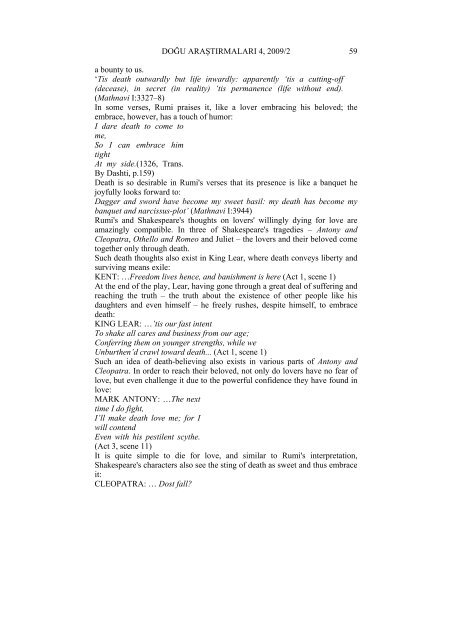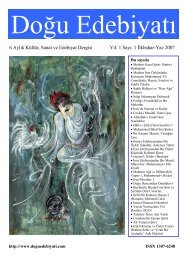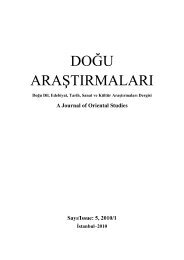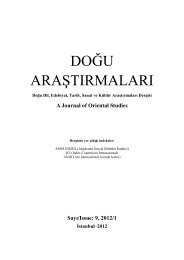A Journal of Oriental Studies Sayı/Issue - Doğu Edebiyatı
A Journal of Oriental Studies Sayı/Issue - Doğu Edebiyatı
A Journal of Oriental Studies Sayı/Issue - Doğu Edebiyatı
You also want an ePaper? Increase the reach of your titles
YUMPU automatically turns print PDFs into web optimized ePapers that Google loves.
DOĞU ARAŞTIRMALARI 4, 2009/2 59<br />
a bounty to us.<br />
‘Tis death outwardly but life inwardly: apparently ‘tis a cutting-<strong>of</strong>f<br />
(decease), in secret (in reality) ‘tis permanence (life without end).<br />
(Mathnavi I:3327–8)<br />
In some verses, Rumi praises it, like a lover embracing his beloved; the<br />
embrace, however, has a touch <strong>of</strong> humor:<br />
I dare death to come to<br />
me,<br />
So I can embrace him<br />
tight<br />
At my side.(1326, Trans.<br />
By Dashti, p.159)<br />
Death is so desirable in Rumi's verses that its presence is like a banquet he<br />
joyfully looks forward to:<br />
Dagger and sword have become my sweet basil: my death has become my<br />
banquet and narcissus-plot’ (Mathnavi I:3944)<br />
Rumi's and Shakespeare's thoughts on lovers' willingly dying for love are<br />
amazingly compatible. In three <strong>of</strong> Shakespeare's tragedies – Antony and<br />
Cleopatra, Othello and Romeo and Juliet – the lovers and their beloved come<br />
together only through death.<br />
Such death thoughts also exist in King Lear, where death conveys liberty and<br />
surviving means exile:<br />
KENT: …Freedom lives hence, and banishment is here (Act 1, scene 1)<br />
At the end <strong>of</strong> the play, Lear, having gone through a great deal <strong>of</strong> suffering and<br />
reaching the truth – the truth about the existence <strong>of</strong> other people like his<br />
daughters and even himself – he freely rushes, despite himself, to embrace<br />
death:<br />
KING LEAR: …’tis our fast intent<br />
To shake all cares and business from our age;<br />
Conferring them on younger strengths, while we<br />
Unburthen’d crawl toward death... (Act 1, scene 1)<br />
Such an idea <strong>of</strong> death-believing also exists in various parts <strong>of</strong> Antony and<br />
Cleopatra. In order to reach their beloved, not only do lovers have no fear <strong>of</strong><br />
love, but even challenge it due to the powerful confidence they have found in<br />
love:<br />
MARK ANTONY: …The next<br />
time I do fight,<br />
I’ll make death love me; for I<br />
will contend<br />
Even with his pestilent scythe.<br />
(Act 3, scene 11)<br />
It is quite simple to die for love, and similar to Rumi's interpretation,<br />
Shakespeare's characters also see the sting <strong>of</strong> death as sweet and thus embrace<br />
it:<br />
CLEOPATRA: … Dost fall?





